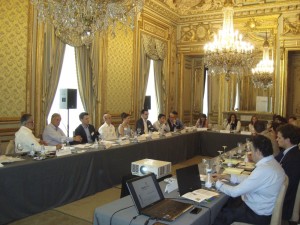
Europe is no easy sell. Most of its citizens identify far more closely with their home country than they do with Europe. The European Union and its institutions seem remote and bureaucratic. Over the past few years, anti-European populism has steadily been gaining ground.
So what can be done to improve this difficult brand? On the last weekend in May, United Europe invited 20 young professionals from twelve different nations to Madrid to try and find answers to this question. In the spectacular rooms of the Casa de America, they spent a day and a half on an intense debate on “How to Brand Europe”.
The opening speaker of this Young Professionals Seminar – United Europe’s fourth event of this kind – was Manuel Marin, long-time Vice President of the European Commission and Speaker of the Congress of Deputies of Spain. Marin gave a fascinating overview over Europe’s changing role in the world. It might be possible for Europe to maintain some degree of global influence, he said, but it would take a very serious effort.
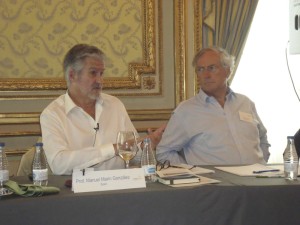
Culture, sports and economy
Marin also made it clear that he believes in subsidiarity and limiting the EU’s scope to issues that need to be dealt with at a European level. “Europe cannot produce policies that solve the small problems of the citizen. That has to be done by national or regional authorities”, he said, adding in a nicely ironic tone: “It is impossible to organise the life of 500 million people. The day when a European citizen will declare his undying love for an EU directive is the day I leave Europe.”
Yet if it isn’t undying love, can Europe at least come to command some loyalty? Can branding help with that? And what exactly are we talking about when we talk about Europe? Hanns Koenig from Germany, the first of the Young Professionals to present his short contribution, did an admirable job in clarifying the issue and linking it to some recent results of the Eurobarometer polls.
According to this survey, Europeans point to culture, sports and the economy as the most important aspects for creating a sense of community, Hanns said. Yet only a minority of survey participants named any of these elements, revealing a considerable degree of disagreement over what unites us as Europeans. A branding strategy for the EU, Hanns concluded, would need to address this.
In the next contribution, Heather Bailey, a British young professional working in the European Parliament, looked at why the EU is such a hard sell. Britain, she pointed out, never signed up to the idea of an ever closer union but only to the single market. Also, while EU policy was part of the school curriculum in France, it was completely absent from British schools.
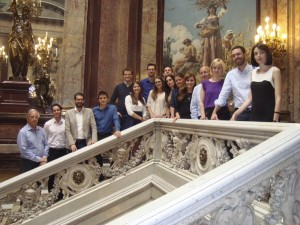
This United Europe’s seminar was made possible by two Spanish companies: Iberdrola SA, one of Europe’s largest energy firms and a company member of United Europe, and Gerdau, the Spanish subsidiary of Brazilian steelmaker Gerdau. Unfortunately, an urgent development made it impossible for Iberdrola’s CEO Dr. Ignacio S. Galan to attend the meeting as planned. Marin, who is President of the Iberdrola Foundation, kindly took over his part.
It was Iberdrola that had chosen the splendidly gilded and decorated 19th century palace on Plaza de Cibeles where the Madrid seminar took place. The Casa de America which normally hosts events related to the Americas is located in the late 19th century Palacio de Linares. Iberdrola was our host for two memorable dinners in Madrid, too. The first took place in the Casino de Madrid’s wonderful and innovative restaurant; the second on the roof terrace of the Palacio de Cibeles.
“In the rest of the world, Europe is a quality label”
Great thanks are also due our second sponsor, Gerdau, whose generous donation made it possible for United Europe to invite young professionals from all over Europe to Madrid. Gerdau’s Director Inigo Legua Eguidazu joined the seminar on the Friday evening to present some facts about the history of his company. Brazil’s Gerdau, founded by German emigrants originating from Hamburg more than a hundred years ago, is the 16th largest steelmaker in the world.
After Inigo Legua’s presentation, the seminar continued with more contributions from participants. Vukasin Bursac, a young Serb, spoke about Yugoslavia, a country created after World War II that disappeared in the horrible civil wars of the 1990s. “You can see Yugoslavia as a small European Union,” Vukasin said. “We invented the brand, created it and destroyed it in the end.”
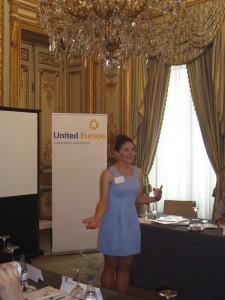
Andrea Rosengren from Sweden was next with very personal experiences of how people from around the world see Europe. “There, Europe is a quality label,” Andrea said. “It’s an amazing contrast about how they see us and how we view ourselves. We have to keep working if we want to be as good about internal branding.”
Between Brits and Bulgarians
In fact, different European nations have widely differing views of the value of European integration. Jenny Paul, a German living and working in Britain, described British scepticism of Europe. Even the fact that English was widely spoken in Europe and the world was turning into something of a barrier, Jenny said, because it made it much less urgent for the British to learn other European languages.
What a contrast to Bulgaria, one of the EU’s most recent members! “Bulgaria is one of the biggest friends of the EU. We love it,” Ivo Bossev said about his native country. Yet this love story has an peculiar twist: Bulgarians admire Europe but don’t really seem to see themselves as part of it; for them, “European” is a quality to be aspired to.
This was the end of the first day which gave us a first taste of the widely different views and concepts that shape our concept of Europe as a brand. Anthony Ruys, former CEO of Heineken and one of the founding members of United Europe, once again acted as mentor and good spirit to the seminar. Thony’s thoughtful comments have inspired every Young Professionals Seminar to date, and we very much hope that he will continue in this role! As Managing Directors of United Europe, Christoph Riess and Bettina Vestring were in charge of organisation, content and logistics of the seminar.
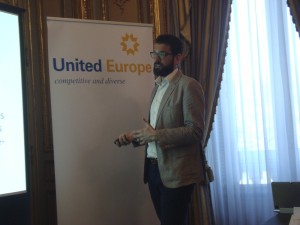
Day Two of the Seminar
Day Two started with serious input from an outside speaker. Caspar van den Berg, Associate Professor at Leiden University, spoke about the politics of branding. How do Europeans of different social and educational background differ in their attitudes to Europe, and which arguments are most likely to hold sway with them? “The communication deficit is a bigger problem than the democratic deficit,” Caspar said, pointing to the fears that many Europeans have of losing their jobs or their way of life.
The discussion continued with two short presentations on nation branding in the United States. Christophe Hemous from France stressed the importance of the frontier in American nation building – an experience that Europe does not have and cannot copy. Andreas Josko spoke about immigration and how it forces a country to think about the value system that it wants immigrants to sign up to. While this debate is finally taking place in Europe, it is still very much oriented at a country’s national history and values, not at the European context.
The next contributions focused on institutions which could help develop the European brand. Hanna Lena Deitmar from Germany spoke about Britain’s Merchandise Marks Act of 1887 that required companies to give a label of origin for their products. Today, a European label could strengthen the brand, as could sports events and fairs. Emilio de Diego Raba from Spain looked at his grandparents’ generation to explain how much attitudes towards Europe have changed. Thanks to Erasmus and other programmes that foster mobility, today’s young Europeans have developed a feeling of belonging to Europe. “Don’t make cuts in these programmes,” Emilio warned.
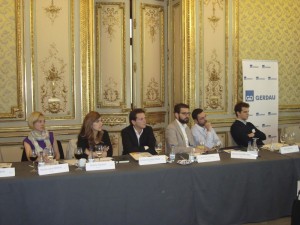
Michele Vangi from Italy was next, speaking about the university as one of the most important European inventions. He also picked up on the importance of the EU’s Erasmus programme, pointing out that young Europeans meeting through this student exchange programme had by now produced one million “Erasmus babies”. Anna Goetsch, a young Austrian, added her own experience from the Leonardo da Vinci programme which fosters mobility among young professionals. Companies, she said, also should do more to increase mobility between their national subsidiaries.
“Who are we, and who do we want to become?”
An unusual perspective was added by Tamara Tatishvili, director of the Georgian National Film Centre. She spoke about the role of culture in building a new identity and communicating it to a complicated group. Jessica Hasbani from Germany told us about the European experiences of PricewaterhouseCoopers, the company where she works. The PwC units in Germany, Austria, the Netherlands and Belgium have joined in a new entity, PwC Europe, in order to be more effective and more attractive to their European clients. But it hasn’t been easy to convince hundreds of mostly older partners that integration is a good thing. “We are the generation that brings the mind set of one Europe into the business,” Jessica added.
With all of this input, participants divided up into three working groups to reflect on the challenges of branding Europe to its citizens. Each group debated for about an hour before coming back to the table. Christoph Hemous, speaking for the first group, spoke of the necessity of reaching public opinion more effectively. “We should take into account a cost-benefit analysis: What benefits has Europe brought, for instance the fact that we have enjoyed peace for such a long time, and our respect for human rights. But there are also risks and dangers that have emerged with the economic crisis and anti-European populism.
Antonio Porras, speaking for the second group, brought in the key word of identity. “The key challenge is to define who we are and who we want to become,” he said. “Now, we are in a difficult economic situation. But we are culturally strong, we have human rights, we are Eurocentric. We want to play a key role in the global world. We want to keep our democracy, be innovative, united and pluralistic.” How can Europe get there? Through education, exchange programmes, a common second language and sports and entertainment events which can satisfy the emotional aspect of identity.
The refugee drama, a shame for Europe
For the third working group, Jenny Paul summed up the results. She started out by asking how Europeans are connected and what makes them different from people elsewhere. A common history, she answered, democracy and human rights, but also Europe’s values of leaving nobody behind, providing welfare and health care for everybody. Even if in practice this sometimes fails, the ideal stands.
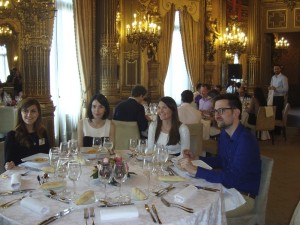
After lunch (another splendid meal in a particularly beautiful room of the Casa de America where on other days, visiting heads of state from Latin American dine), the Madrid seminar moved to the last set of contributions from participants. In this bloc, we looked at policies that could contribute to Europe’s reputation both with its citizens and the rest of the world. It was Preben Harrington, a young Belgian, who began with a short presentation on the importance of leadership to help Europe regain its relevance.
Antonio Porras from Spain explained the close link between defence, an army and identity. Looking at the challenges from beyond Europe’s borders, Antonio singled out the refugee drama in the Mediterranean. “In a United Europe we should not let that happen,” he said.
Only in Europe!
The debate continued with a look at Europe’s soft power potential which Dyria Aloussi, a German of Syrian origin, focused on. As examples, she cited state building and civil society initiatives, but also sports events and entertainment. Next was Stefan Richter from Austria who called for better branding for Europe’s products and the completion of the single market. “We need to set up a European Silicon Valley,” Stefan said.
In the last of the short contributions, Manuel Gonzalez Igual from Spain gave a passionate plea for more European action against youth unemployment. “Branding is about providing true value,” he said. The EU, he said, had devoted more than 150 billion euro to rescuing the financial sector in Greece. In contrast, only six billion euro had been dedicated to fighting youth unemployment. “Are we producing a lost generation?”, Manuel asked. “Fighting the unemployment of young people must be our absolute priority.”
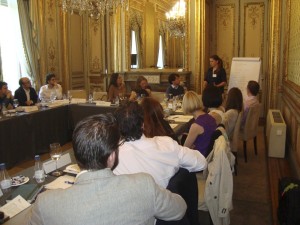
After a brief debate, the group once again divided into working groups. On the basis of the seminar’s discussions, each group was to propose conclusions on how to brand Europe. As a result, all three groups came back with a highly focused approach. “Define who we are. Define actions. Create a slogan and then make better use of communication channels,” Jenny Paul explained. In an intense debate, participants then filled in the gaps of this concept, describing what makes Europe different and worth identifying with.
What would branding be without an advertising slogan? The Madrid seminar concluded with a great idea for a series of slogans all ending with the motto “Only in Europe”. Examples include “28 countries. One union. You will never walk alone. Only in Europe,“ or „Free speech in 28 countries. Only in Europe.”
Do you have an idea for a “only in Europe” slogan? On behalf of United Europe, we call on all the young professionals who have attended one of our seminars as well as their colleagues and friends to think up a good motto and send it to us. There is a prize, too: whoever comes up with the best slogan, can chose which of our Young Professionals Seminars in 2016 he or she would like to attend. So get your thinking hats on!


